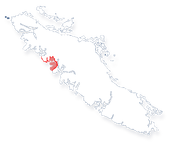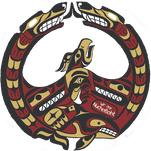Our Vision: A future where our community is educated, empowered, and self-governing.
|
Off-Reserve
(approximately)
|
Our
Members
|
On-Reserve
(approximately)
|
Our TerritoryNuchatlaht is a small community located approximately 3 hours west of Campbell River in a remote portion of Vancouver Island. It is a member of the Nuu-chah-nulth Tribal Council which consists of 14 communities along the western portion of Vancouver Island. Nuchatlaht has approximately 20 members living on-reserve and a total membership of 162.
|
Governance BuildingThe Governance building is designed to be a multi-purpose building that houses the administration offices, offices for Chief and Council, and is a flexible space for hosting meetings, community dinners and fund raising events. The grand opening of the building was September 14, 2012.
|
Chief and CouncilOur Chief and Council consists of our Tyee Ha'wilth Jordan Michael, and his 3 counselors; Erick Michael Michael, Archie Little, and Mellissa Jack
|
A member of the Nuu-Chah-Nulth Tribal Council
The Nuu-chah-nulth Tribal Council (NTC) is a not-for-profit society that provides a wide variety of services and supports
to fourteen Nuu-chah-nulth First Nations with approximately 10,000 members.
The NTC serves its members in three key ways:
to fourteen Nuu-chah-nulth First Nations with approximately 10,000 members.
The NTC serves its members in three key ways:
|
Program & Service Delivery
The NTC delivers a wide variety of programs and services to participating Nuu-chah-nulth First Nations and their members. Many of these services were once delivered by federal or provincial governments. The NTC is able to adapt these programs and services to some degree so they better meet the unique cultural and other needs of our people. |
Political Advocacy
The NTC works to create awareness and advocate for change on an array of socio-political and other issues that affect Nuu-chah-nulth people. |
Centralized Administration
The NTC provides a variety of centralized administration and coordination services for participating Nations, including membership records and status card services. Shared services can provide Nations with significant cost savings, better access to skilled workers, and more consistent access to project funding. |
The 14 Nuu-chah-nulth First Nations are divided into three regions:





































